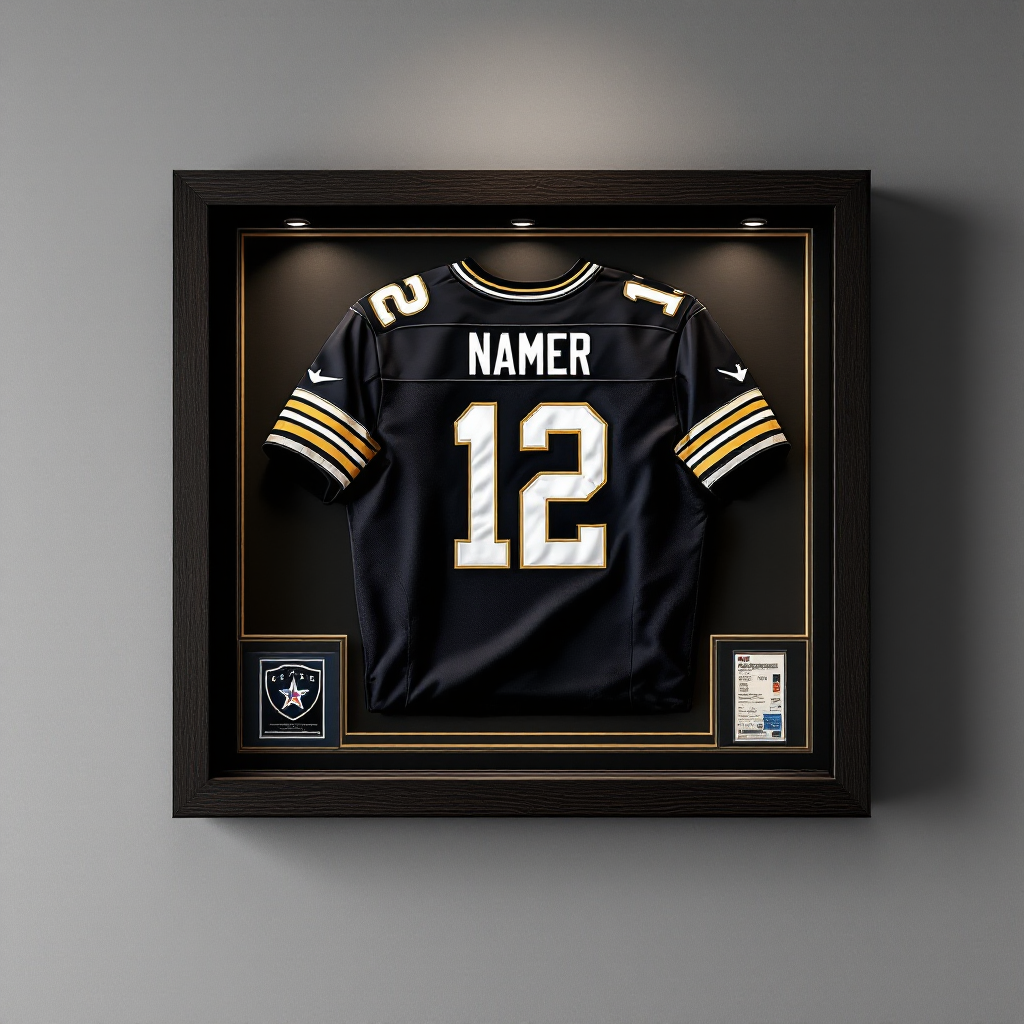Introduction
Precious sports jerseys often spend years hidden in closets or drawers, slowly deteriorating instead of being proudly displayed. Whether it’s a signed memorabilia piece, a game-worn treasure, or a jersey with personal significance, improper storage risks fading, creasing, and damage that diminishes both sentimental and monetary value. This comprehensive guide will show you exactly how to frame a sports jersey properly to preserve its condition while creating a stunning display piece for your home, office, or fan cave.
Why Frame Your Sports Jersey?
Sports jerseys represent more than just team merchandise – they embody memories, achievements, and passionate fandom. Properly framing a jersey transforms it from fabric folded in storage to a showcase piece with multiple benefits:
- Preservation: Professional framing protects from dust, UV damage, and handling
- Display: Creates an eye-catching focal point in any room
- Value Protection: Maintains condition for collectible or autographed jerseys
- Storytelling: Converts a personal memento into conversation-starting décor
- Organization: Eliminates storage challenges for awkwardly-shaped items
Whether you’re preserving a signed NFL jersey, showcasing a championship basketball uniform, or displaying your child’s first hockey jersey, proper framing ensures your sports memorabilia remains in pristine condition while enhancing your space.
Professional vs. DIY Jersey Framing
When deciding how to frame a sports jersey, you have two primary options:
Professional Framing Services:
Advantages:
- Expert conservation techniques
- Acid-free, museum-quality materials
- Precision mounting and alignment
- UV-protective glass options
- Professional appearance
- Often includes warranty coverage
Disadvantages:
- Higher cost ($150-$500+)
- Relinquishing control of the process
- Potential shipping risks for online services
- Longer completion timeframe
DIY Jersey Framing:
Advantages:
- Significantly lower cost ($50-$150)
- Complete creative control
- Immediate project completion
- Personal satisfaction
- No transportation risks
Disadvantages:
- Quality depends on your skills
- Requires special materials and tools
- Potential for mistakes
- Time investment
- May lack professional preservation features
Your choice ultimately depends on the jersey’s value, your budget, and your comfort with hands-on projects. For valuable signed memorabilia, professional framing offers important preservation benefits, while DIY approaches work well for personal items when cost is a primary concern.
What You’ll Need for Jersey Framing

Whether choosing professional services or DIY methods, understanding the essential components for quality jersey framing helps ensure excellent results:
Frame Components:
- Shadow box frame: Deep enough to accommodate jersey thickness (typically 1.5-3″ depth)
- Backing board: Acid-free foam core or conservation board
- Mounting materials: Pins, thread, or adhesive mounting corners
- Matting: Acid-free, color-complementary mat board (optional)
- Glass/acrylic cover: Preferably with UV protection
- Hanging hardware: Appropriate for the frame’s weight
Tools Required for DIY Framing:
- Measuring tape
- Straightedge ruler
- Cutting mat
- Utility knife
- Clean cotton gloves
- Acid-free adhesive or mounting tape
- Stainless steel pins
- Framing staple gun
- Level
- Cleaning supplies
For DIY enthusiasts, craft stores like Michaels or Hobby Lobby sell complete shadow box kits specifically designed for jersey framing, simplifying your material gathering process.
Step-by-Step Guide to Framing a Sports Jersey
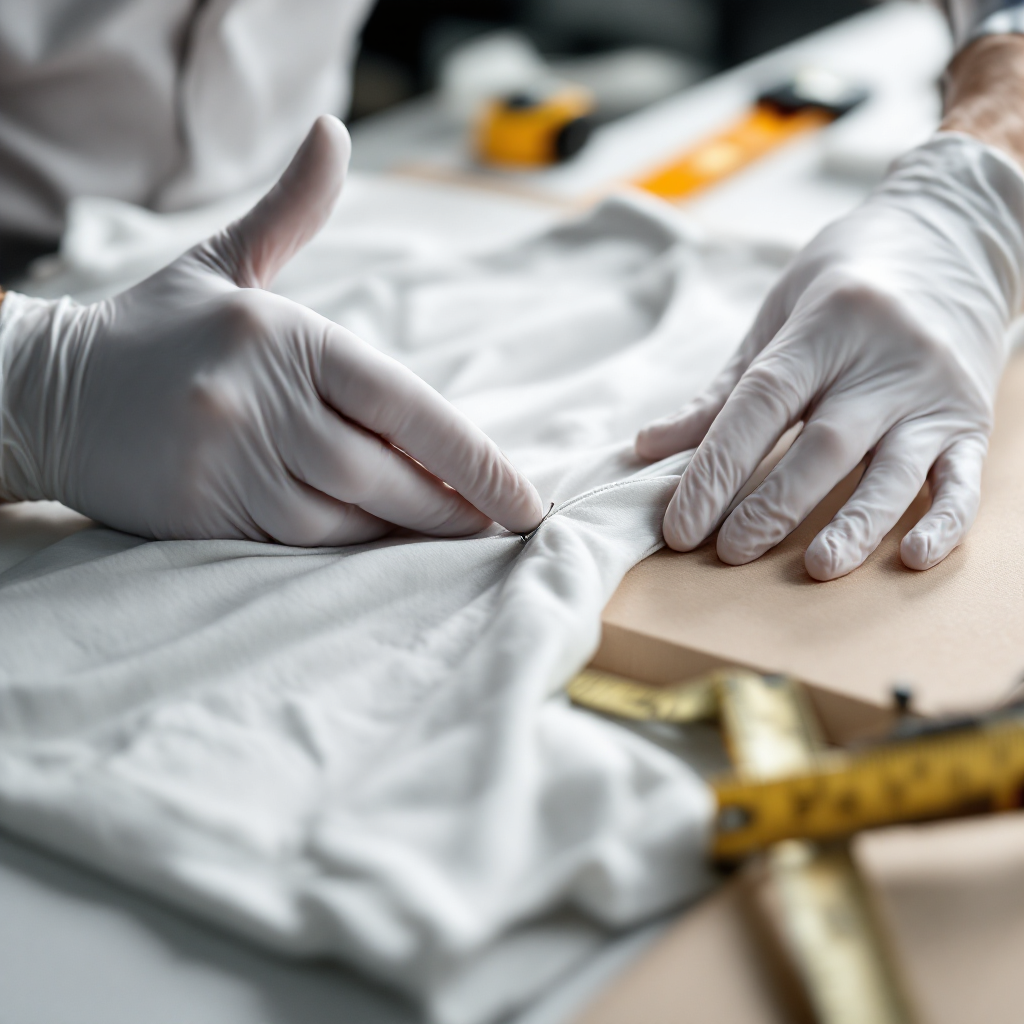
1. Prepare Your Jersey
- Gently clean the jersey following manufacturer recommendations
- Remove stains if possible (consult a professional for valuable items)
- Steam or iron carefully on appropriate setting to remove wrinkles
- Allow to completely dry before framing
2. Plan Your Layout
- Determine if you’ll display front-only or both sides (requiring a double-sided frame)
- Consider incorporating photos, ticket stubs, or other memorabilia
- Measure and sketch your design, ensuring proper proportions
- Select complementary matting colors (typically team colors)
3. Prepare the Shadow Box
- Clean frame interior thoroughly
- Cut backing board to precise dimensions
- If using matting, cut and secure to backing board
- Ensure all materials are completely dry
4. Mount the Jersey
Method 1: Sewing Method (Most Professional):
- Position jersey on backing board
- Use invisible thread and small stitches at strategic points
- Sew through jersey and backing board at shoulders, sides, and bottom
- Create natural folds in sleeves and adjust until perfectly aligned
Method 2: Pinning Method (Easiest):
- Position jersey on backing board
- Insert stainless steel pins at inconspicuous locations
- Hide pins behind folds or in seams
- Secure approximately every 3-4 inches around perimeter
Method 3: Adhesive Method (For Non-Valuable Jerseys):
- Apply acid-free mounting tape to backing board
- Carefully position jersey and press gently
- Use additional tape for securing sleeves
- Not recommended for valuable/collectible jerseys
5. Add Supporting Elements
- Secure any additional items (photos, tickets, medallions)
- Add descriptive cards or labels if desired
- Ensure all elements are securely attached
6. Assemble the Frame
- Place mounted jersey assembly in shadow box
- Secure backing according to frame design
- Seal edges with acid-free framing tape
- Attach hanging hardware rated for the frame’s weight
7. Display Considerations
- Hang away from direct sunlight
- Avoid areas with temperature/humidity fluctuations
- Use proper wall anchors to support weight
- Position at eye level for optimal viewing
How to Frame Different Types of Sports Jerseys
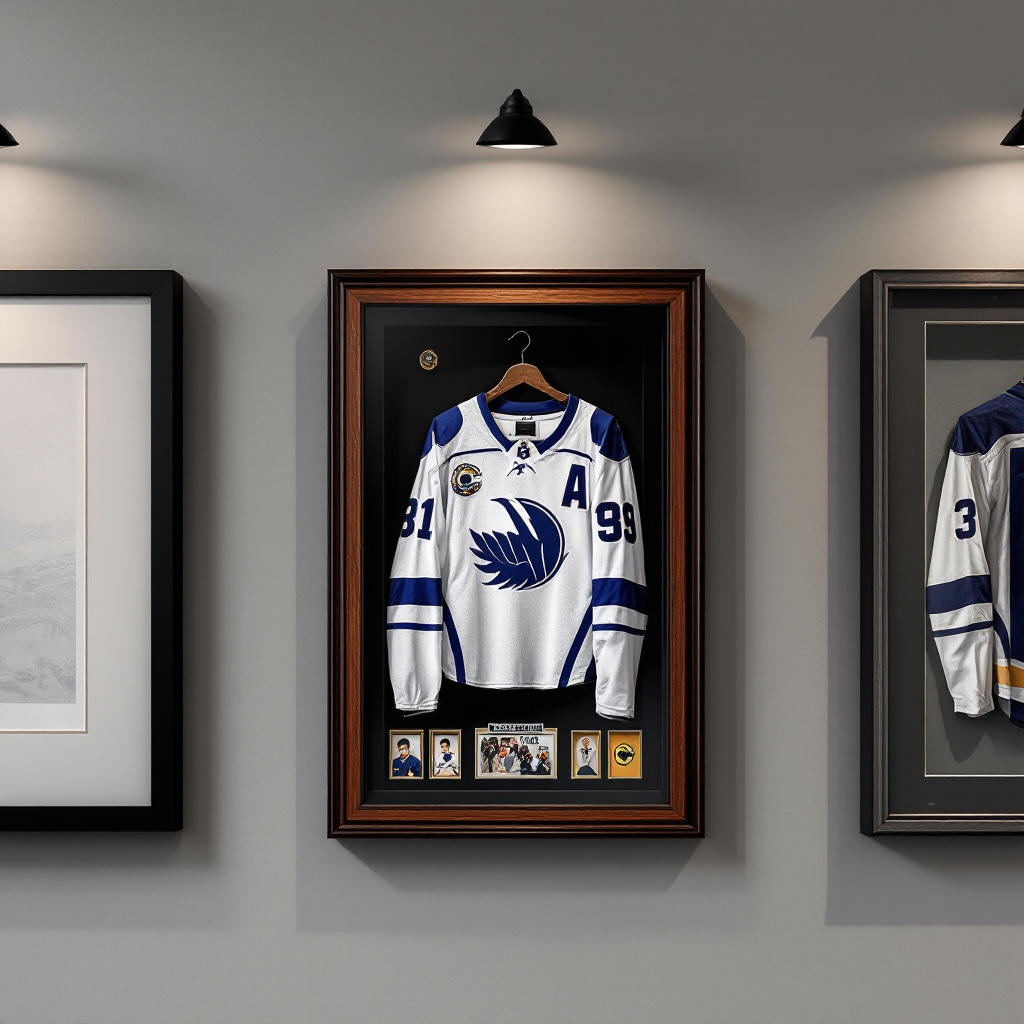
Different sports jerseys present unique framing challenges based on material, size, and design elements:
How to Frame a Football Jersey
Football jerseys typically have large numbers and mesh material:
- Mount with numbers prominently displayed
- Gently stretch to show design features
- Consider displaying a mini helmet or game ticket alongside
How to Frame a Basketball Jersey
Basketball jerseys are lighter with distinctive cuts:
- Center the jersey with numbers visible
- Consider a circular mounting pattern for sleeveless design
- Complement with tournament brackets or team photos
How to Frame a Hockey Jersey
Hockey jerseys are heavier with complex logos:
- Use extra support pins/stitches for weight
- Consider creative sleeve folding to show team logo
- Position to highlight front crest and player number
How to Frame a Baseball Jersey
Baseball jerseys have distinctive button fronts:
- Mount either buttoned or unbuttoned
- Align to showcase team logo and number
- Consider including baseball cards or game-day programs
How to Frame a Soccer Jersey
Soccer jerseys feature colorful designs and sponsor logos:
- Position to highlight key sponsor elements
- Consider including tournament patches
- Complement with team scarf or match ticket
Where to Get a Jersey Professionally Framed
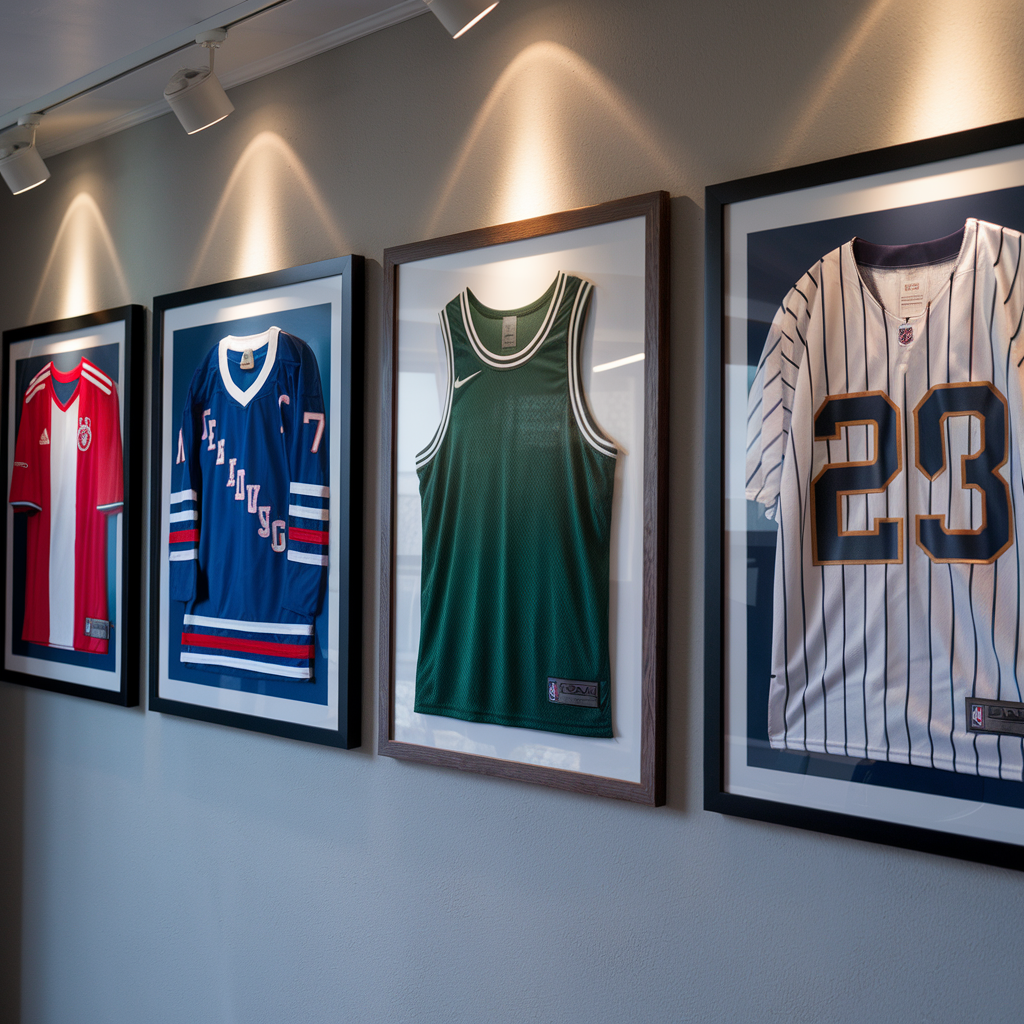
If you’ve decided professional framing is the right choice, several reliable options exist:
National Retailers:
- Michaels – Offers sports-specific framing packages
- Hobby Lobby – Provides custom shadow box options
- Jo-Ann Fabrics – Features custom framing services
- FRAMEWORC by PictureFrames.com – Specializes in jersey framing
Sports Memorabilia Specialists:
- Sports Displays – Focuses exclusively on sports memorabilia
- Collectible Supplies – Offers conservation-grade framing
- Hall of Fame Memorabilia – Provides authentication and framing
Local Options:
- Independent frame shops (often with more personalized service)
- Sports memorabilia retailers
- University bookstores (for college jerseys)
When selecting a framing provider, request information about:
- UV-protective glass options
- Acid-free materials
- Mounting techniques
- Frame warranty
- Turnaround time
- Authentication services (if applicable)
Average Costs of Jersey Framing
Understanding pricing helps set realistic expectations for your project:
Professional Framing Cost Factors:
- Basic Professional Framing: $150-$250
- Premium Conservation Framing: $250-$500+
- Double-Sided Display: Add $100-$200
- UV-Protective Museum Glass: Add $50-$150
- Custom Matting and Effects: Add $50-$100
- Additional Memorabilia Items: Add $25-$75 per item
DIY Framing Costs:
- Pre-made Shadow Box: $40-$100
- Custom-Cut Shadow Box: $75-$150
- Conservation Materials: $25-$50
- Tools (if needed): $20-$40
- Total DIY Cost: $50-$200
Cost-Saving Tips:
- Watch for framing store sales (often 50-70% off)
- Purchase shadow boxes during holiday discounts
- Use coupons from craft store apps
- Consider group discounts for multiple jerseys
- Ask about price-matching policies
DIY Jersey Framing on a Budget
For those wondering how to frame a jersey yourself without spending a fortune:
Option 1: Repurpose a Deep Picture Frame
- Find a large, deep picture frame (at least 20″x24″)
- Remove glass and replace backing with foam board
- Cover foam board with fabric in team colors
- Pin jersey to prepared backing
- Reassemble frame
Option 2: Create a Simple Shadow Box
- Purchase a shadow box kit from a craft store
- Follow manufacturer instructions for assembly
- Use straight pins at jersey seams for mounting
- Position pins in inconspicuous locations
- Secure backing and hang
Option 3: Custom Cardboard Shadow Box
- Cut pieces from sturdy cardboard for frame sides
- Cover with decorative paper or fabric
- Assemble with strong adhesive
- Mount jersey to backing board
- Attach clear acrylic sheet as front protection
Budget-Friendly Tips:
- Use coupon apps for craft store purchases
- Shop second-hand stores for frames to modify
- Consider group projects with fellow fans to share tools
- Watch online tutorials for specific techniques
- Start with a less valuable jersey for practice
Tips for Properly Displaying Your Framed Jersey
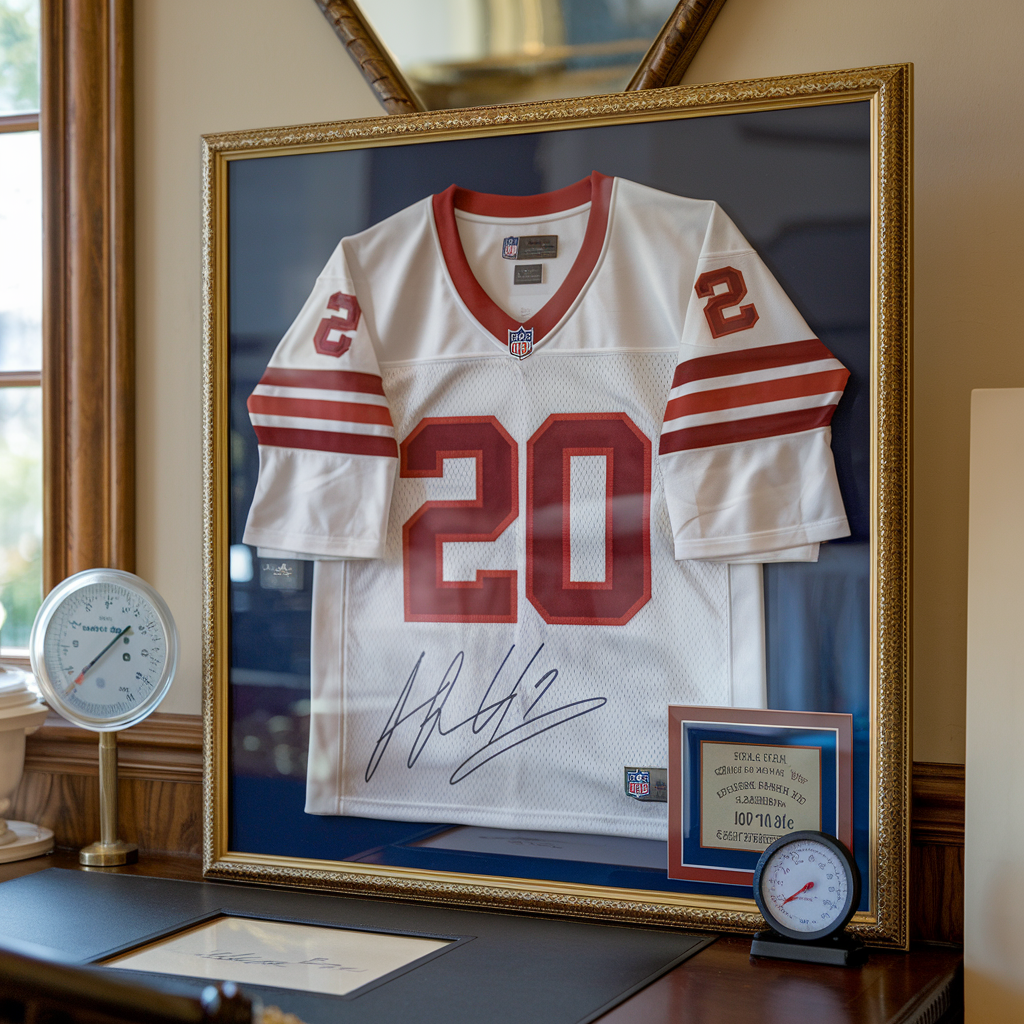
Once framed, proper display ensures long-term preservation:
Ideal Placement:
- Avoid direct sunlight which causes fading
- Maintain consistent room temperature (65-75°F)
- Keep humidity levels moderate (40-50%)
- Position away from air vents and fireplaces
- Hang at eye level (approximately 57-65″ from floor)
Secure Mounting:
- Use appropriate wall anchors based on frame weight
- Consider security hanging systems for valuable items
- Ensure frame sits flat against wall
- Use level to confirm straight alignment
- Consider museum putty for corner stabilization
Lighting Considerations:
- Avoid direct spotlights on frame
- Consider LED museum lighting fixtures
- Use indirect lighting when possible
- Install dimmer switches for adjustable illumination
- Consider picture lights with UV filters
Preservation Techniques for Framed Jerseys
Proper preservation ensures your framed jersey remains in excellent condition:
Temperature and Humidity Control:
- Install a hygrometer to monitor conditions
- Use dehumidifiers in basements or humid environments
- Avoid attics and garages for valuable displays
- Consider climate-controlled display cases for significant items
Cleaning and Maintenance:
- Dust frame exterior gently with microfiber cloth
- Clean glass with ammonia-free cleaner
- Never spray directly onto frame
- Inspect annually for signs of fading or damage
- Reframe every 10-15 years for valuable pieces
Insurance and Documentation:
- Photograph framed jersey for insurance records
- Keep receipts and certificates of authenticity
- Consider riders on homeowners insurance for valuable items
- Document framing materials and techniques used
- Store digital copies of documentation securely
FAQs About Framing Sports Jerseys
Can I frame a jersey myself if it’s autographed?
What size frame do I need for an adult football jersey?
How do I frame a jersey to see both front and back?
Will pinning damage my jersey?
How much does it cost to frame a hockey jersey?
Does Hobby Lobby frame jerseys?
How long does professional jersey framing take?
Can I use a regular picture frame for a jersey?
Conclusion
Framing a sports jersey transforms a meaningful piece of fabric into an impressive display that preserves memories and creates striking décor. Whether you choose professional services or tackle the project yourself, proper planning and materials ensure your jersey remains a treasured keepsake for years to come.
For those with valuable signed memorabilia, the investment in professional framing provides peace of mind through conservation-grade materials and techniques. DIY enthusiasts can achieve impressive results by following proper mounting methods and using quality materials.
Remember that the true value of a framed jersey comes from the memories it represents and the stories it tells. By following the guidance in this article, you’ll create a display worthy of those precious moments that connects your passion for sports with your personal space.
Visit frameley.com for more sports memorabilia display solutions and professional framing services to showcase your most treasured team memories.

